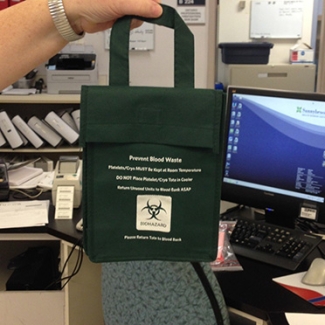For some patients who experience blood loss, transfusion with a blood product called albumin is often used to help restore their blood volume. However, albumin may not always be beneficial to the patients who receive it.
Research that examines the evidence for appropriate use of blood products, like albumin, is important for both improving patient outcomes and for ensuring healthcare resources are used efficiently. That’s why Canadian Blood Services supports research programs like University of Toronto’s Quality in Utilization Education and Safety in Transfusion (QUEST), a research collaborative aiming to improve appropriate transfusion practice though evidence-based transfusion care.
QUEST examined the use of albumin in patients recovering from cardiac surgery and published their results in the Canadian Journal of Anesthesia. Dr. Justyna Bartoszko, a cardiac anesthesiologist at the Toronto General Hospital and QUEST researcher who was part of the research team, says training in the intensive care unit first led her to the idea that albumin use was worth examining more systematically.
“When I was training as a fellow, we would often use albumin in cardiac surgical patients in the ICU, but the usage patterns were always very different, based on the attending physician,” explains Dr. Bartoszko. “It was hard to know if the albumin we transfused was really better than using a little more crystalloid (an electrolyte solution not derived from blood) and I was never really given compelling reasons for why some attendings used albumin frequently and others didn't.”
The research findings, based on data collected in Canadian hospitals during the 2017-2018 FIBRES randomized controlled trial, showed that albumin use did not notably improve patient outcomes based on a number of measures. This finding was consistent with other large studies involving ICU patients.
The authors suggest that health care providers should re-examine their reasons for routine use of albumin in cardiac surgery patients but note that more definitive evidence is needed. “Although routine use of albumin in most patients after cardiac surgery does not seem to improve major outcomes likes morbidity and mortality, certain subpopulations and higher risk patient groups are thought by many clinicians to benefit from albumin,” says Dr. Bartoszko. “I think the next step is a randomized controlled trial that focuses on these patient groups.”
To learn more about QUEST’s study on albumin use, view Canadian Blood Services’ Research Unit.
For health care professionals seeking more information about albumin, its uses and alternatives, visit Chapter 3, Albumin, in Canadian Blood Services’ Clinical Guide to Transfusion.
Canadian Blood Services – Driving world-class innovation
Through discovery, development and applied research, Canadian Blood Services drives world-class innovation in blood transfusion, cellular therapy and transplantation—bringing clarity and insight to an increasingly complex healthcare future. Our dedicated research team and extended network of partners engage in exploratory and applied research to create new knowledge, inform and enhance best practices, contribute to the development of new services and technologies, and build capacity through training and collaboration. Find out more about our research impact.
The opinions reflected in this post are those of the author and do not necessarily reflect the opinions of Canadian Blood Services nor do they reflect the views of Health Canada or any other funding agency.
Related blog posts
People with a low platelet blood count, such as cancer patients receiving chemotherapy, can receive a platelet transfusion to boost their platelet count. But what is the best approach to platelet transfusion? In its latest publication, the International Collaboration for Transfusion Medicine Guidelines examines the quality of seven platelet transfusion guidelines.
A study conducted by researchers in the University of Toronto QUEST program, a research collaborative supported by Canadian Blood Services, looked at what can be done to reduce the number of inappropriate red blood cell transfusions in hospitals.
Despite the critical and increasing demand for platelets within the health-care system, they remain the most commonly discarded blood component in Canada. Improper storage outside of the hospital blood bank is the main reason that platelets get discarded before they’ve reached the end of their 7-day shelf life. A team from University of Toronto QUEST research program tested a storage bag specially designed to address the problem of platelet discards.


